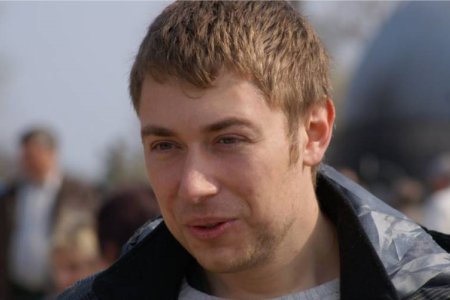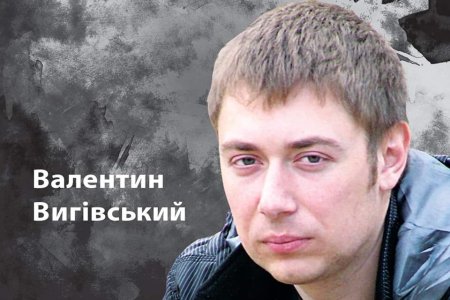
Valentin Vyhivsky was 31, married, with a small son, when the Russians abducted him in 2014, subjected him to months of savage torture and sentenced him to 11 years on insane ‘spying’ charges. He turned 41 on 3 August 2024, having lost ten years of his son’s childhood, and of his own life. If Russia gets his way, and unfortunately that is looking likely, Valentin will face another year of hell in Russian captivity before he is released.
There is little or nothing new to be said, nor can there be until Valentin is freed and safely back in Ukraine. That, however, is only because Russia has systematically blocked any access to its longest imprisoned Ukrainian political prisoner, and it must be prevented from allowing him to be forgotten.
It remains unclear why Vyhivsky was targeted, however his lifelong fascination with aviation had led him to correspond with other enthusiasts, including many in Russia, with that having attracted Russian FSB [security service] attention as far back as 2012. The regime of Vladimir Putin has reinstated a Soviet-era culture of denunciations, and any contact with Ukrainians would have been viewed with suspicion after Russia’s invasion of Crimea in February 2014. It is possible that the Russian woman who played a fatal role in Vyhivsky’s abduction went to the FSB herself, fearing that her contact with a Ukrainian, and one who had taken part in the Euromaidan protests, would otherwise be used against her. What does seem certain is that her plea in September 2014 that Valentin help her with money, supposedly for her grandfather’s cancer operation, was a ploy to get Valentin to Crimea which was already under Russian occupation. Petro Vyhivsky had opposed his son’s plans, but Valentin explained that the woman had said that she could not herself come to Kyiv, because she was employed by the Russian defence industry.
Vyhivsky set off for Simferopol on 17 September 2014. He planned to meet and pass his acquaintance the money, then return that evening to Kyiv. His family now believe that he was seized immediately, at the railway station, and almost immediately taken, against his will, to Russia. There he was held incommunicado for eight months, without a proper lawyer or contact either with the Ukrainian consul or his family.
He was initially charged under Article 183 of Russia’s Criminal Code with illegally receiving and divulging commercial, tax or banking secrets. This was then changed to the much more serious charge of trying to gather Russian state secrets to pass on to the Ukrainian Security Service [SBU]. The FSB version after his conviction was that Vyhivsky had “come to their attention in 2012 and was suspected of gathering information containing commercial secrets through bribes, as well as information containing state secrets in order to pass them to a representative of a foreign state.
Had there been any grounds for accusing a Ukrainian citizen of ‘spying’, Russia would not have held him incommunicado for so many months and would have allowed him to see a proper lawyer. Over the first eight months, Vyhivsky only once met anybody unrelated to the ‘investigation’. Russian human rights activist Zoya Svetova, who had been approached for help by the young Ukrainian’s parents, reported that Vyhivsky was clearly frightened and refused to say anything to her, even what article of the criminal code he was charged under. Vyhivsky was only allowed a visit from the Ukrainian consul after eight months, and then in the company of two guards who immediately stopped them if they tried to talk about anything but ‘neutral subjects’. The same thing happened when his mother was allowed a visit after nine months. He managed to tell her only that “they know how to persuade you”. He did, however, also show her the marks on his body remaining from these ‘methods of persuasion’, which also almost certainly included not only beatings, but mock executions and, perhaps, electric current torture. These methods of extracting ‘confessions’ have been a standard component of Russia’s ‘trials’ of Ukrainians since 2014, with ‘spying’ charges an FSB favourite since the entire ‘trial’ can be held behind closed doors.
Vyhivsky had already been ‘convicted’ and sentenced in October 2015 to 11 years’ imprisonment when he was finally allowed access to an independent lawyer. The lawyer was, however, forced to sign a non-divulgence agreement or face criminal prosecution. The appeal which is likely to have detailed the torture used to obtain his ‘confession’ was, predictably, rejected by Russia’s Supreme Court on 31 March 2016. To this day, Valentin’s family have no real idea what (if anything) he was charged with, nor why he has been kept in almost total isolation.
Valentin Vyhivsky is held prisoner in the same Kirov region of the Russian Federation where his grandfather, Stepan Vyhivsky, was imprisoned, on no less grotesque charges, during the regime of Joseph Stalin. Stepan was released after Stalin’s death. Under Putin’s regime, his grandson remains in savage incarceration.
PLEASE write to Valentyn Vyhivsky! Even just a few words will tell him and Russia that he is not forgotten.
Letters need to be in Russian, and any political subjects or reference to his case should be avoided. If possible, include an envelope and some thin paper as he may well try to reply.
If Russian is a problem, please instead try to help publicize Valentin Vyhivsky’s plight. The recent release of political prisoners (in exchange for a Russian state killer, cyber criminals and spies) makes it clear that publicity can help to secure the release of political prisoners. Our silence helps only the Kremlin.
Address (Valentin’s year of birth needs to be given, as here)
Russia 613040, Utrobino, Kirov oblast, Prison colony No. 11,
Vygovsky, Valentyn Petrovych, born. 1983
(or in Russian) Кирвская обл. г. Кирово-Чепецк. д. Утробино ФКУ ИК-11 УФСИН Россия 613040
Выговскому Валентину Петровичу 1983 г.р.



